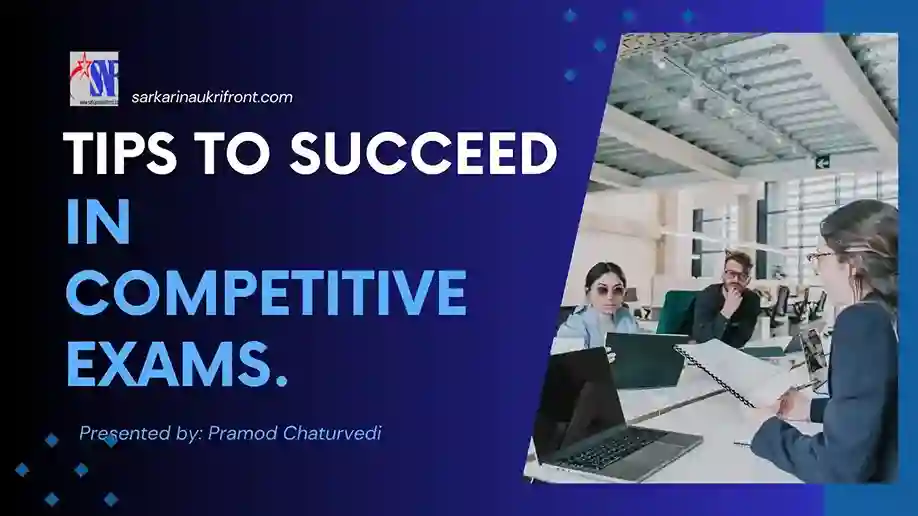11 Essential Tips for Success in Competitive Exams:
Your Path to Achieving Your Goals
Last updated: 12:49:32 AM, 04/11/2025

Introduction:
Competitive exams provide access to a wide range of educational and professional options. Success depends on commitment, practical tactics, and a determined mindset, whether you’re trying to get into college, land a government job, or succeed in any competitive evaluation. We’ll examine 11 crucial strategies and tactics in this article to help you succeed in competitive exams.
You may visit “NPCIL Executive Trainees Vacancy 2024” to explore more job opportunities.
-
Set, Clear Goals
Setting clear, attainable goals is the first step to success in competitive exams. Decide what you want to achieve, whether it’s a target grade or a particular position. A clear objective will keep you motivated and assist you in developing a well-organized study routine.
-
Create a Study Plan
An efficient study schedule is necessary for exam preparation. Set aside time to cover each item on the syllabus by breaking it up into digestible chunks. Regular revisions and practice exams should be part of your plan to monitor your development.
-
Gather Quality Study Materials
Choose trustworthy study resources, including online courses, textbooks, and reference books. Make sure they correspond to your exam and are recommended by professionals or past successful candidates.
-
Time Management
Time management skills are essential. Give yourself time to read, reflect, and unwind. Avoid cramming; it can make you exhausted and reduce your memory ability. Instead, choose regular, spaced-out study sessions.
-
Understand the Exam Pattern
Learn the exam format, including the number of questions, the scoring system, and the time allotted. With this knowledge, you’ll be able to adjust your study strategy to the unique requirements of the exam.
-
Practice Regularly
Perfect practice makes perfect. To simulate exam conditions, solve previous years’ question papers and take mock examinations. This will help you organize your time more effectively, improve accuracy, and identify areas requiring particular attention.
-
Seek Guidance
Teachers’ and mentors’ advice
- Expertise: Teachers and mentors have substantial knowledge and expertise in their disciplines. They can offer useful insights into the disciplines or themes you’re studying for the competitive exam.
- Structured Learning: Teachers and mentors can provide structured guidance, assisting you in comprehending the syllabus, key topics, and exam patterns. They can design study plans that are specific to your needs and objectives.
- Clarification of Doubts: If you face difficulties or have queries, teachers and mentors are always there to provide explanations and clear up any confusion. This individual assistance can considerably improve your knowledge of difficult subjects.
Interacting with an experienced mentor can be motivational. They can provide success stories and ideas that will motivate you to stay focused and committed to passing your exam. Coaching Course Enrollment:
- Coaching classes often follow a defined curriculum that is designed to cover the whole syllabus. This guarantees that you do not overlook any crucial topics and that your study plan is thorough.
- Regular Evaluations: Many coaching classes administer regular tests and evaluations to monitor your progress. These assessments simulate exam settings and assist you in identifying areas for development.
- Peer Learning: In a coaching class, you will learn with other hopefuls. Interacting with peers helps you to exchange ideas, explore difficult topics, and discover new views, creating a collaborative learning environment.
- Expert Guidance: Good coaching centers often have experienced faculty who are well-versed in the specific exam’s requirements. They can provide expert guidance, shortcut techniques, and time management strategies.
-
Stay Healthy
Physical and mental well-being are paramount for effective study. Maintain a balanced diet, get sufficient rest, and engage in regular exercise to keep your energy levels up and reduce stress.
-
Stay Motivated
Moments of self-doubt are natural during preparation. Stay motivated by reminding yourself of your goals, celebrating small accomplishments, and visualizing your success.
-
Stay Updated
Stay informed about current affairs, especially if your exam includes a general knowledge section. Subscribe to relevant newspapers, magazines, or online news sources to stay up-to-date.
-
Exam Day Preparation
On the day of the exam, prioritize a good night’s sleep, a light meal, and arriving at the exam center early. Ensure you have all necessary documents and stationery, and maintain a positive mindset.
Conclusion
Success in competitive exams is not solely about intelligence but about the right combination of preparation, strategy, and perseverance. Recognize that setbacks are a part of the journey, and learning from them will make you stronger. Stay focused and stay motivated, and you’ll significantly enhance your chances of achieving the success you aspire to in your competitive exams. Whether it’s a government job or college admission, competitive tests are the gateway to educational and professional opportunities.
You may also like:
Memory Enhancement Strategies and Techniques
World Economic Forum and Its Relevance to the Global Economy
